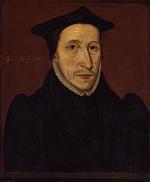Disable ads!
John Jewel
Under Elizabeth's succession he returned to England, and made earnest efforts to secure what would now be called a low-church settlement of religion; he was strongly committed to the Elizabethan reforms. Indeed, his attitude was hardly distinguishable from that of the Elizabethan Puritans, but he gradually modified it under the stress of office and responsibility. He was one of the disputants selected to confute the Romanists at the conference of Westminster after Easter 1559; he was select preacher at St Paul's Cross on 15 June; and in the autumn was engaged as one of the royal visitors of the western counties. His congé d'élire as bishop of Salisbury had been made out on 27 July, but he was not consecrated until 21 January 1560. He now constituted himself the literary apologist of the Elizabethan Settlement. He had on 26 November 1559, in a sermon at St Paul's Cross, challenged all comers to prove the Roman Catholic case out of the Scriptures, or the councils or Fathers for the first six hundred years after Christ. He repeated his challenge in 1560, and Dr Henry Cole took it up. The chief result was Jewel's Apologia ecclesiae Anglicanae, published in 1562, which in Bishop Creighton's words is the first methodical statement of the position of the Church of England against the Church of Rome, and forms the groundwork of all subsequent controversy. The work was translated into English by Anne Bacon to reach a wider audience and was a significant step in the intellectual justification of Protestantism in England. Later years[edit] A more formidable antagonist than Cole now entered the lists in the person of Thomas Harding, an Oxford contemporary whom Jewel had deprived of his prebend in Salisbury Cathedral for recusancy. He published an elaborate and bitter Answer in 1564, to which Jewel issued a Reply in 1565. Harding followed with a Confutation, and Jewel with a Defence of the Apology in 1566 and 1567; the combatants ranged over the whole field of the Anglo-Roman controversy, and Jewel's theology was officially enjoined upon the Church by Archbishop Bancroft in the reign of James I. Latterly Jewel had been confronted with criticism from a different quarter. The arguments that had weaned him from his Zwinglian simplicity did not satisfy his unpromoted brethren, and Jewel had to refuse admission to a benefice to his friend Lawrence Humphrey, who would not wear a surplice. He was consulted a good deal by the government on such questions as England's attitude towards the Council of Trent, and political considerations made him more and more hostile to Puritan demands with which he had previously sympathized. He wrote an attack on Thomas Cartwright; which was published after his death by Whitgift. Collapsing after a sermon at Lacock, Wiltshire, he was taken to the episcopal manor house of Monkton Farleigh where he died on 23 September 1571. He was buried in Salisbury Cathedral, where he had built a library. Richard Hooker, who speaks of Jewel as the "worthiest divine that Christendom hath bred for some hundreds of years," was one of the boys whom Jewel prepared in his house for the university; and his Ecclesiastical Polity owes much to Jewel's training. Jewel's works were published in a folio in 1609 under the direction of Bancroft, who ordered the Apology to be placed in churches, in some of which it may still be seen chained to the lectern; other editions appeared at Oxford (1848, 8 vols) and Cambridge (Parker Soc., 4 vols). See also Gough's Index to Parker Soc. Publ.; John Strype's Works (General Index); Calendars of Domestic and Spanish State Papers; Dixon's and Frere's Church Histories; and Dictionary of National Biography (art. by Bishop Creighton). A house at Bishop Wordsworth's School in Salisbury is named for him.
 Read more on wikipedia.org Read more on wikipedia.org
 All quotes by John Jewel All quotes by John Jewel
 Edit Edit
|

|
|
|
|
|
Background photo by Giuliana
|